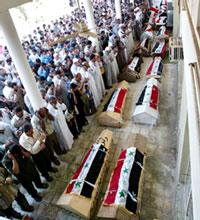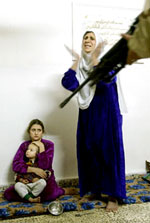JIM.LOBE
- The “War on Terror” Exposed (FCN Webcast, 05-2004)

WASHINGTON (IPS/GIN) – The observance of Memorial Day, the annual commemoration of U.S. soldiers who died in the service of their country, took place at a particularly difficult moment for both the U.S. armed forces and the administration of President Bush due to the recent news from Iraq and Afghanistan–where a total of some 150,000 U.S. troops are currently deployed.
While the fatal crash of a runaway military truck in Kabul sparked the worst outbreak of anti-U.S. demonstrations in the Afghan capital since the ouster of the Taliban in late 2001, dozens of people, including two British members of a CBS News television crew, were reported killed in the latest surge of gunfire and bomb attacks throughout Iraq.
The recent incident in Afghanistan, in which at least half a dozen people were reported killed–some allegedly by U.S. troops–in the rioting that followed the crash, underlined the degree to which foreign forces are increasingly resented. It also temporarily diverted attention to the unprecedented resurgence of Taliban forces in the country’s Pashtun belt, where a series of violent clashes have left several hundred dead over the past two weeks.
In Iraq, where the new government headed by Prime Minister Nouri Al-Maliki is still struggling to gain consensus on who should head the all-important defense and interior ministries, the ongoing violence and intensified ethnic cleansing, particularly in Baghdad, are forcing a reassessment.
While the situations in both countries underline the doubtfulness of Pres. Bush’s pledges of “complete victory”–most recently voiced at the U.S. Military Academy at West Point graduation–in his “war on terror,” what makes this year’s Memorial Day particularly downbeat is the impending release of an official report on what almost certainly was a massacre of as many as two dozen unarmed Iraqis, including one 5-month-old baby girl, carried out by U.S. Marines in Haditha, Iraq, last November.
First reported in March by Time magazine, the three- to five-hour killing spree, which is being widely compared to the bloodier 1968 My Lai massacre that helped turn public opinion decisively against the Vietnam War after it became public in late 1969, has reportedly already been detailed to some lawmakers behind closed doors by senior military officers and Pentagon officials.
But major U.S. newspapers, including the Times and the Washington Post, have since provided accounts based on eyewitness testimony by residents of Haditha, an insurgent stronghold in Al-Anbar province, as well as second-hand reports by lawmakers, notably ex-Marine veteran and Iraq War critic, Democratic Rep. John Murtha, about what they have been told.

The massacre was reportedly triggered by the bombing of a military convoy that resulted in the death of one Marine. A squad of Marines subsequently conducted a sweep of the neighborhood, first killing five men in a taxi, then invading two homes where they killed unarmed men, women and children, most at close range.
One congressional official described the killings to the Times as “methodical in nature.” Despite initial reports to the contrary, no indication has emerged that the Marines faced armed resistance or attack at any time during their sweep.
“This was not an immediate response to an attack,” another former Marine, Republican Rep. John Kline, also told the Times. “This would be an atrocity.”
Worse, as in My Lai, there appears to have been an attempt to cover up the incident, including planting evidence to indicate the presence of armed resistance and lying to military investigators. The initial descriptions of the killings as resulting from the original bombing and then a running battle between the Marines and insurgents also proved false.
The fact, however, that no serious investigation of the killings appears to have taken place until after the appearance of the Time’s report more than four months after the incident–coupled with the military’s offer of $2,500 per victim to the surviving family members in compensation, a decision normally handled at senior levels–has added to the impression that the Marines or the Pentagon or both had tried to prevent the killings from coming to light.
These factors were cited by Murtha, whose ties to the uniformed military are considered particularly close and who first disclosed the preliminary results of the military’s investigation just weeks ago, as evidence of a cover-up.
The Republican chairman of the Senate Armed Services Committee, John Warner, announced that he would hold hearings on the incident, including the reaction of “senior officers in the Marine Corps.”
In the Haditha case, one battalion commander and two company commanders have reportedly been relieved of their posts, while several Marines who allegedly carried out the killings are being held in the brig at their home base at Fort Pendleton, Calif., pending the completion of the investigations. A dozen other Marines have also been implicated, according to published reports.












